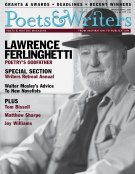Bissell's parents divorced in 1977 when he was three years old, but his mother and father ending up living a few blocks away from each other. He and his brother, Johno, drifted between the two houses. Bissell remembers Caputo once showed up at his father's house in the early '80s, just after his novel The Horn of Africa (Holt, Rinehart, and Wilson, 1980) was published and had been optioned by actor Michael Douglas. "As I recall," says Bissell, "and he might dispute this, Phil turned up in Michigan that year in a Ferrari, or a Porsche, and he had a trunk full of hardcover copies of The Horn of Africa. It's a huge book and a great book. It's one of my favorite novels. And I remember handling it, and seeing this sports car, and Phil himself looked great, and I remember thinking, ‘Wow, this looks like a very cool way to make a living!'"
Caputo says he wishes it had been a Ferrari or a Porsche, but it was merely a Nissan 280ZX. Nonetheless, the impression he made on young Tom Bissell was lasting. So Bissell did what any hopeful writer will do: He read. John Updike's Rabbit, Run electrified him. John Gardner's Grendel inspired him. He was so smitten by Charles Baxter and Spalding Gray that he called them on the phone. "Gray was actually blown away that some kid in Michigan had read and liked his novel so much," Bissell says. Jonathan Franzen says that after he published his famous 1996 Harper's essay, "Perchance to Dream" (later retitled "Why Bother?"), he started getting letters from a kid in Michigan that were "a combination of fan letter, confessional, manifesto, argument, and pure exuberance."
Along with reading voraciously, Bissell started writing. In junior high he wrote poems about Lake Michigan. In high school he wrote a novella titled "Mall Zombies." Then, at seventeen, he wrote "Dandelions Grow in Heaven," a short story about a father explaining the death of the family dog to his two kids. Bissell gave the story to Caputo, a hardened war reporter who'd seen plenty of death in his time.
"I remember he knocked on my bedroom door," says Bissell, "and he came in and sat down and looked at me. And he said, ‘You know what? Keep it up. You should keep doing this.' That was the first time he ever encouraged me, and I remember that really vividly. I thought, ‘Wow, maybe I should keep doing this.'" Bissell kept doing it all the way through high school—which was about all he was doing besides smoking weed, dropping acid, and failing classes.
"I'm always startled that Tom came out of Escanaba," says Harrison from his home in Montana. "That's where he started out his desperately undistinguished academic career. He was a slow starter, but that's often true of writers."
"We were wondering," says Caputo, "if he was going to graduate high school for a while. We were even talking about him getting a GED or something."
Bissell may have had to do just that if it hadn't been for his high-school creative writing teacher, Doug Fix. "He was the only person at that time in my life who had good things to say to me," Bissell recalls. "I don't think he quite knew what hit him when I walked into his classroom, because after he encouraged me I was suddenly giving him fifty-page short stories. And he read them all. He read everything I gave him. And my becoming a writer—I think the only person happier with my becoming a writer than my mother or me was Doug."
After squeaking by at graduation, Bissell headed off to Bay de Noc Community College in Escanaba, where he met another great teacher. "Tom came into my poetry and fiction writing class and just tore up the pea patch," says Larry Leffel, who reports that Bissell was already dragging along two novels he'd written. "Not only were they novels—they were very promising novels. I could tell right away, here was that rare combination of immense talent with the drive, the discipline, and the devotion to carry on with it."
Leffel nudged Bissell toward the Bennington Summer Writing Workshop in Vermont, which he attended in the summers of 1993 and 1994. There he met fiction writer Bob Shacochis, who was an instructor. Shacochis still remembers the author as a very young man. "He had a mullet and a ponytail, black engineer boots and heavy-metal T-shirts," he says. "His jaw was always packed with chewing tobacco, and he was always spitting into a cup. He was a northern Michigan boy who had wandered into the wrong camp." Shacochis recalls that Bissell wrote "really weird heavy-metal science fiction," though Bissell insists he has never written any sci-fi, heavy metal or otherwise.
Bissell put in one year at Bay de Noc, and in 1993, moved down the road to Michigan State, where he started coediting the Red Cedar Review, the school's literary magazine, which was founded by one of his favorite writers, novelist Thomas McGuane. There Bissell published early work from then-emerging fiction writers like Lisa Fugard, the author of the novel Skinner's Drift (Scribner, 2006), Tom Paine (The Pearl of Kuwait, Harcourt, 2003), and Mark Jacobs (A Handful of Kings, Simon & Schuster, 2004). It was also at Michigan State where Bissell finished his third novel, which he asked his dad's friend Caputo to look at.








